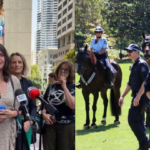Police Shooting Victim is Stripped of Compensation

His story might sound like something out of a nightmare, but for Justin McMaster, it’s a harsh reality.
In the early hours of September 26, 2011, the then-19-year-old was sleeping with his family at home in Colyton in Sydney’s west, when they were suddenly ambushed by a group of three men carrying out a brutal home invasion.
During the traumatic incident, offenders held a knife against the throat of Mr McMaster’s 17-year-old sister Kayla and threatened to sexually assault her. His mother and stepfather were also assaulted by the intruders.
Fearing for their lives, the family called ‘000’ and asked police to come and help them.
But instead of offering protection to the family, Constables Natasha Klienman and John Fanning made a horrific error of judgment and shot Mr McMaster in the stomach as he fled the home, mistakenly believing that he was one of the offenders.
The incident was witnessed by Mr McMaster’s family, who tried to tell police that he was a victim, not an offender – but in spite of these warnings, police made the decision to shoot.
The family was understandably angry and distressed about the incident, with Mr McMaster forced to spend weeks recovering in Westmead Hospital while his parents and siblings struggled to move on with their lives. In 2013, Mr McMaster took the matter to court, seeking compensation from the NSW Police Force for their negligence.
The officers testified in court that they thought Mr McMaster was an intruder as he had fled the scene and ran down the street screaming and brandishing a curtain rod. Mr McMaster stated that he was simply trying to protect himself and his family after having witnessed his sister being held at knifepoint.
Judge Phillip Mahoney found that police were never under any threat from Mr McMaster and awarded him $512,450 in compensation, finding that police had committed an act of ‘deliberate assault and battery and trespass to his person.’ His sister and mother, who witnessed the shooting, were awarded sums of $132,430 and $90,000 respectively.
But on Monday the family was ordered to repay the entirety of the money, with Justices Beazley, McColl and Meagher of the Court of Appeal overturning the District Court judgment and finding that Constable Fanning’s decision to pull out his gun in light of Mr McMaster brandishing the curtain rod ‘was reasonable in view of what he understood had occurred in that house, which also suggested that this man may have a knife.’
The Court also found that Mr McMaster ‘was committing a civil assault at the time he was shot,’ and that ‘as he got closer to Constable Kleinman’s position on the roadway, he presented, unless stopped, a threat of significant injury.’
The family have also been ordered to pay the costs of the appeal, which is expected to be in the tens of thousands of dollars.
Decision Gives Police Free Reign to Shoot
Mr McMaster’s lawyer told the media that the decision effectively gives police free reign to use their weapons in non-threatening situations, and expressed his concern that Mr McMaster was deemed to be in the wrong simply for attempting to defend himself and his family.
The lawyer’s comments are a cause for concern given the recent increase in police shootings both in Australia and abroad.
In many cases, the targets of these shootings are not as lucky as Mr McMaster, and tragically lost their lives. Most victims were people who had been accused of committing an offence, or who posed a threat to others around them – and police had been called upon to control or diffuse the situation.
But sadly, police often act in the heat of the moment and reach for their weapons, resulting in tragic outcomes. Between 2008 and 2011, there were a total of 14 fatal police shootings around the nation, seven of which took place in New South Wales. Investigations reveal that in many cases, the deceased person suffered from a mental health condition.
These findings have prompted calls for police to receive better training to deal with mentally ill people, and that police should adopt a more passive approach – rather than reaching for their guns. New South Wales took a positive first step last year; rolling out a new one-day training program to prepare officers for confrontations with the mentally ill.
In light of unjustified killings of civilians such as the shooting of Adam Salter in 2009 and the subsequent police cover up, it is evident that stricter controls and greater accountability for the use of weapons by police is desperately needed, as is a body that is independent of the police force to investigate such killings.
But with decision-makers recently granting police the power to wear or carry firearms into court, it’s unlikely that more stringent protocols or accountability will be introduced anytime soon.






